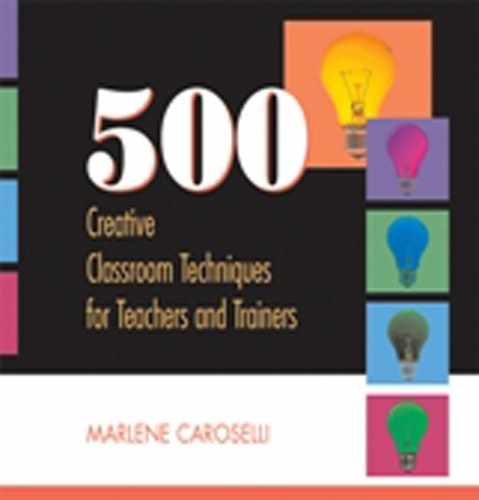
500 Creative Classroom Techniques for Teachers and Trainers
92
20. Debunk myths or prevalent wisdom. (concluded)
Brainteaser:
If a duck and three-quarters lays an egg and three-quarters in a day and three-
quarters, how many eggs do seven ducks lay in a week?
Answer: You have to do some mind-stretching to figure this one out. Imagine a super-duck that can lay an egg and ¾ of an
egg in one and ¾ day. So, it’s laying 1 egg per 1 day and 7 eggs in 7 days. Now, figure out how many super-ducks are there in
7 ducks. To find out, divide 7 by 1 and ¾ and you get 4 super-ducks, which is the same as 7 regular ducks. Multiple 4 super-
ducks (the same as 7 of those regular ducks) times 7 eggs a week and the answer is 28 eggs a week.
21.
H
ave them stratify the course content and then recall
quotes related to the stratifications.
We’ve already talked about stratification—the process of breaking down a broad topic into
several categories or subheadings. Divide participants into groups of five or six, and have them
decide on 6–10 topics they believe the course is based on (or should be based on). Have one
representative from each group meet in a breakout room or in the corridor to reach agreement
on a final list of 6–10 stratification categories.
When they return to the room, stop your lecture and ask them to write the categories on the
flipchart. Then ask each team to choose two categories and write as many famous quotes
regarding that category as they can think of. (It will help to have several books of quotations
available for classroom use.)
Have a roving recorder listen in and do some swapping. If a team seems stuck finding quotes on
one of their two topics, they can do an exchange using the recorder as a broker. She will give
another group a quote they can use for their list, but that group will have to give up a quote
needed by the group that was stuck.
22.
U
se multi-quote lists as stimuli.
Some people are known for one memorable and quotable statement. Others, for a number of
them. (You’ll see from the examples that a single expert can provide considerable verbal fodder
for classroom use.) If yours is a specialized topic (such as quantum physics), you may have to do
some reading to come up with your lists. (I strongly recommend Meg Wheatley’s Leadership and
the New Science.) Biographies are an especially good source of relevant quotes from a single-
person source.
Distribute the list of quotes and have participants circle the one that most piques their interest,
for whatever reason. Then form groups based on their selections. Ask them to discuss and then
summarize their insights.
(continued)

Chapter 6: 25 Ways to Use Quotations
93
22. Use multi-quote lists as stimuli. (concluded)
Stimulating Words of Wisdom
From Oscar Wilde:
• To know everything about oneself, one must know all about others.
• When people agree with me, I always feel that I must be wrong.
• The tragedy of old age is not that one is old, but that one is young.
• The old believe everything; the middle-aged suspect everything; the young know everything.
• I can resist everything except temptation.
• Education is an admirable thing, but it is well to remember from time to time that nothing worth knowing
can be taught.
• Experience is the name everyone gives to their mistakes.
• Nothing succeeds like excess.
• Discontent is the first step in the progress of a man or a nation.
From Aristotle:
• We are what we repeatedly do. Excellence then, is not an act but a habit.
• To understand the metaphor is the beginning of genius.
• Art consists in bringing something into existence.
• A beginning is half the whole.
• Character is the result of our conduct.
• The greatest crimes are caused by surfeit, not by want. Men do not become tyrants in order that they may
not suffer cold.
• Democracy is where the poor rule.
• Fear is pain arising from the anticipation of evil.
• A fool contributes nothing worth hearing and takes offense at everything.
From anonymous sources
On genius:
• Genius is that which generates heat and progress.
• Genius is a fugitive from the law of averages.
• Genius is something you can’t be by trying.
On happiness:
• Happiness is enjoying doing and enjoying what is done.
• Happiness is not what we have, but what we enjoy.
• Happiness is not created by what happens to us, but by our attitude toward each happening.
On ignoramuses:
• An ignoramus is someone who despises education.
• An ignoramus is someone who can’t explain what he doesn’t like.
• An ignoramus is someone who doesn’t know about what you learned yesterday.
On money:
• Money is the fringe benefit of a job you like.
• Money is the only true aristocracy.
• What gives value to money is work exchanged.
..................Content has been hidden....................
You can't read the all page of ebook, please click here login for view all page.
